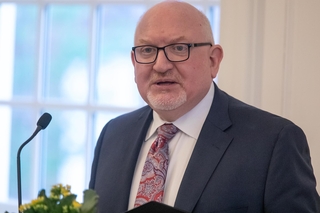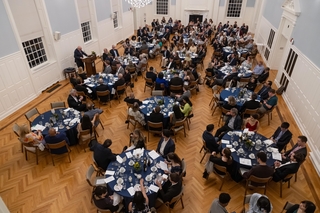2025 Commencement dinner remarks

Professor Martin Jean (Photo credit: Harold Shapiro)
On Sunday, May 18, Professor Martin Jean shared remarks with the students graduating from the Yale Institute of Sacred Music at the annual Commencement dinner.
“I have had the privilege of standing at this podium on this day more times than I am comfortable saying. As I see you now, you have a look not dissimilar to classes that have gone before you – proud, happy, hopeful, fearful, exhausted, or just plain burned out. Each of the graduating classes that preceded you, did their work in years that had their ups and downs which were marked and celebrated on this night, but I struggle to remember a year like 2024-25.
It seems as though every corner of society has been turned on its head. Our social safety net is under redefinition, our economy is in the throes of reconstruction, our foreign policy is shifting, and the academy is under more scrutiny now than ever in my lifetime.
The challenges and threats faced around the world are deeply concerning. The apparent disregard for basic human rights to safety and freedom globally is alarming, and the urgent environmental crisis cannot be ignored.
The fact is that whatever crisis we are in can often delude us into thinking that we are in a new crisis. In fact, these crises are seldom new at all, but simply moments that shine the light on cracks in the fabric of society that have been there all along, often times shrouded from view of people like us who get to sit in lovely rooms like this and go to France on a nice trip.
People have felt for ages that they’ve been left behind—abandoned, dislocated, oppressed—because of their age, economic status, education. Because of their ability, their skin color, their sexual or gender identity. They have felt under threat because of the place in which they live, because of who has more power than they, because of what they believe or whom they love.
However you slice this, we are speaking about fractures in our communities—fissures that have been opened up, some of which seem prehistoric. These are different forms of isolation—one person from another; one community from another.
One of the highlights of the year for me was the privilege of hearing the tri-partite Taylor Lectures in the fall given by Rowan Williams, former Archbishop of Canterbury, under the title the “Claims of Solidarity”, in which he traced a long sinuous history of the concept. He began by telling of the ways Classical thinkers framed it as a virtue, then taking us through the use or the word among trade unionists in the 19th century, standing in solidarity against something, then through its less precise conflation with the idea of empathy, as a feeling of togetherness with my fellow human.
He finally settled his gaze on two Eastern European thinkers – the Roman Catholic Polish priest and philosopher Jozef Tischner, and the Czech political theorist, Jan Patočka, who wrote about solidarity in quite a different way, as the brotherhood of the broken, or as the solidarity of the shaken.
Bishop Williams commended to us this thought: that to think of ourselves in solidarity means to think of ourselves as the opposite of being isolated. We are all by nature, as human selves, in solidarity with the other and with the whole of the created world, and that our lives are meant to live into this understanding. Easier said than done, I know!
This is another way of debunking the idea of the autonomous person, one who lives solely for themselves and is powered solely by their own ego or will. That’s a failed project, despite how many people try to do it. I’m first. Fill-in-the-blank First.
Instead, we are each born in essence as contingent, fragile, reliant on each other, and in need of those around us, where our very well-being is dependent on the well-being of the other, and the well-being of the other constitutes, in part, our own well-being.
We are part of the siblinghood of the broken.
He goes through a wonderful narrative around the way language works and claims that no one can learn language alone—a newborn cannot learn a language that is recognizable by the other unless they are taught it. And so, from the very beginning, the idea of meaning-making is necessarily a communitarian process.
The concept of solidarity is built into the fabric of so much culture, philosophy and theology. I’ve only read the tiniest bit of this, of course. In Judeo-Christian thought, creation is one, in solidarity with itself, because it is made in the image of God. In Christianity, we speak of the body of Christ—one single organism made of many parts working as a whole. Other traditions speak of siblinghood or brotherhood of creation, like that of a family. Others commune with ancestors that are still present among us, and commune with nature whose parts are, themselves, the manifestation of Divine Spirit. This broad idea of solidarity is hard to escape.
Some of this might appear self-evident, but it begs the question as to the nature of solidarity in contradistinction from isolation. Solidarity is more than banding together in protest against something you don’t espouse. In fact, this version of solidarity (Tischner/Petočka) is the opposite of a me versus them mentality. It is solidarity without enemies. It is another way of understanding the self, or, if you will, the soul. None of us, not one, are truly alone.
Now, I can hear all of you introverts out there thinking, ugh! Does this mean I’m destined to be stuck in bloody small group discussions the rest of my life?
Well, you will be in small group discussions, yes, because true solidarity grows through communication, through conversation. Through “language-ing.” But many of you have chosen a solitary lifestyle which involves hours of lonely work in your study, in a collection or archive, in a practice room, in a chapel, honing your skills, focusing your prayers, writing sermons, and constructing your narratives and critiques.
But whether you know it or not, whether you are headed for the classroom or pulpit, the picket line or concert stage, you are an active agent in solidarity. Whether you will lead worship, read a poem, paint, or perform, you are doing so for those who will receive your work through reading, listening, through prayer and reflection. Those whose pulses will slow as the phrase you sing begins to spin. At every turn, you are about the business of gathering—of community building—of making visible our invisible interconnectivity.
You are about the business of love.
Williams underscores this in his lectures as he directs our attention to the idea of work. That work, itself, all work, in fact, is never done truly alone, but rather, done with the other in mind.
I’ve outlined some ways above that this might apply to you, but I return to the act of prayer. That repeated act of self-emptying, of dispossession, that act of love when we make known, make recognizable the needs of ourselves and the needs of our neighbor.
It is an act that in one way or the other, whether you know it or not, or like it or not, name it or not, all of us here will in some way likely be involved. There is, after all, in all your work an inherent invitation to come together for the sake of others. And as daunting as it may be to do this work in the world to which you are going, be reminded that you’ve started this work at a very high level long before you showed up on our doorstep. You already know how to do this, and I predict, your aptitude will only grow.
But I’ll leave you with this: know you are not alone. You stand in a company of saints who precede and surround you. You are supported by acts of love you may never be able to name. And you, yourselves, are joining a chorus whose song began before time itself, in the heart of God. It was sung already when the morning stars were new, it gathered a chorus of fragile voices, made stronger because they sing together, a chorus whose intricate, diverse, and irresistible polyphony continues its loving invitation to all those who can hear it.”

The ISM Commencement dinner in the Old Refectory at Yale Divinity School, May 18, 2025. (Photo credit: Harold Shapiro)